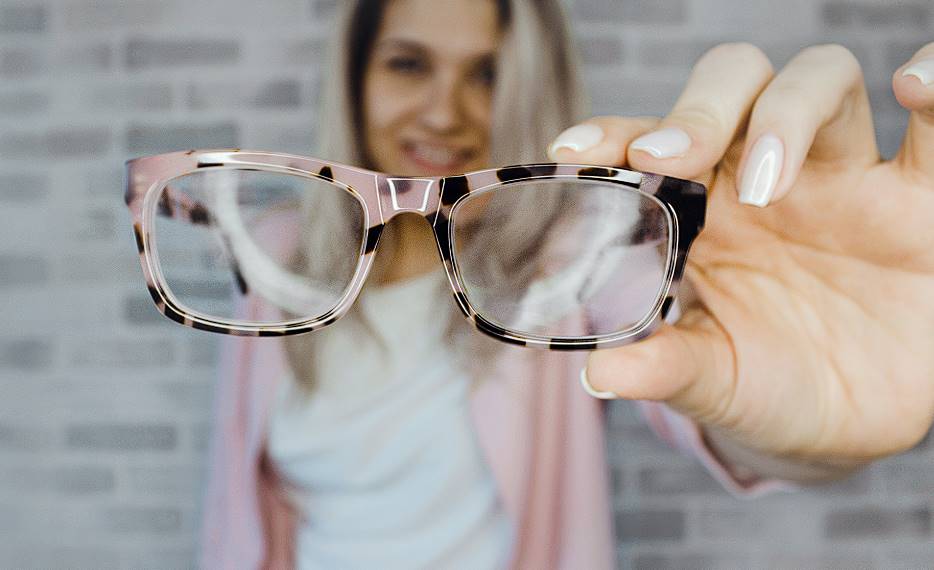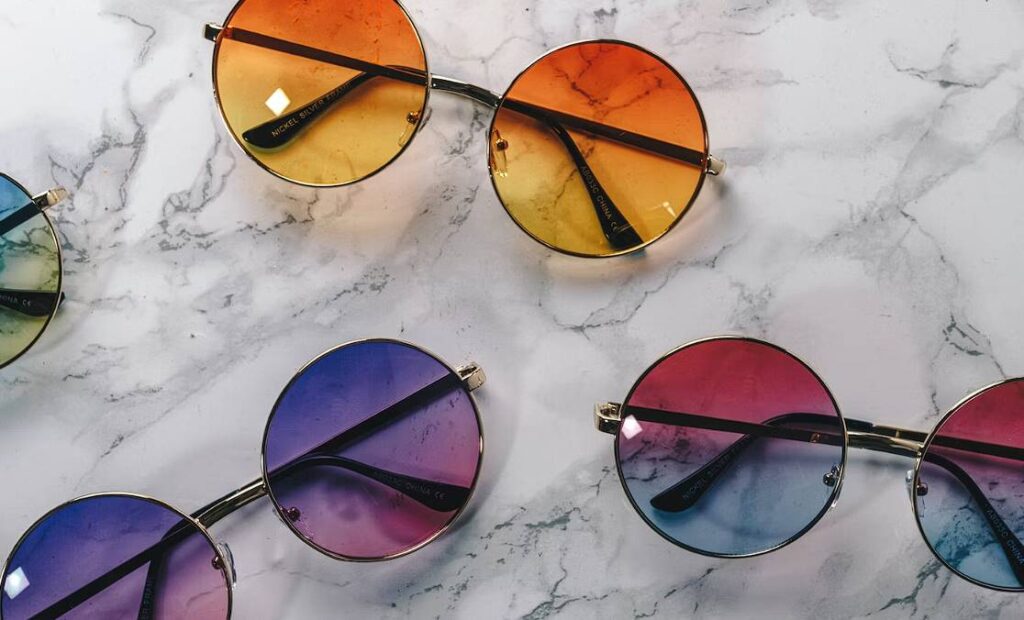When should you obtain new glasses? It's a common line of enquiry among those who have to get their eyes fixed. When you need to get a new pair of glasses depends on factors like how often your prescription changes, how often your glasses break, how often you want to update your look, and how often improvements are made to eyewear technology. Maintaining healthy eyes requires staying on top of eyewear fashions to guarantee clear vision and a pleasant wearing experience.
This blog will discuss the various factors and recommendations that can be used to identify the need for new glasses. We'll help you make educated decisions about your eyewear, from knowing when it's time for an upgrade to knowing how to care for your frames properly.
Why Do I Need An Eye Exam Before Getting New Glasses?
Changes in your eyesight that affect your ability to read, use a computer, or see far away may indicate a refractive error requiring corrective lenses. You might also need to remember the last time you had an eye exam, experience flashes of light, or develop headaches. It could be time for a visit to the eye doctor.
Your eyesight may be deteriorating to the point where you need to purchase a pair of reading glasses. You may have a preexisting condition that calls for close medical attention and a different medication. If you've noticed sun damage to your eyes, your optometrist may suggest a certain pair of sunglasses to wear during the day.
Getting glasses may be necessary for a variety of reasons, but you should only do so after consulting with an eye doctor. You should wait to go out and buy a new pair of glasses from the store if you start having vision problems. It's still important to figure out why your eyes are changing, even if you find a pair that helps.

What Activities Require What Types Of Glasses?
Reading Glasses
These eyeglasses are designed to treat presbyopia, a condition characterised by progressive farsightedness that typically manifests itself in people aged 40 and up. Presbyopia can necessitate bifocals for people who already wear corrective lenses. Even people with perfect vision need glasses for reading and other close-up work.
It would be best if you got reading glasses from an optometrist for the best results, but you might be able to find them without a prescription. But you'll need special reading glasses if your eyesight has changed by more than +3.00.
Transition Lenses
You won't want to wear clip-on sunglasses over regular eyewear or tote around prescription sunglasses. Instead, many people use transition lenses, which automatically darken under direct sunlight. These lenses offer protection from UV rays but can be inconvenient if they darken in bright indoor environments.
Standard Eyeglasses
Glasses, which consist of a pair of lenses separated by frames and worn at a specific distance from the eye, are one of the earliest forms of vision correction. To correct refractive defects, including farsightedness, nearsightedness, and astigmatism, the glasses' lenses come in various shapes and thicknesses. Cataract and glaucoma sufferers might also benefit from corrective eyewear in order to see better. An employee has trouble seeing the computer screen up close and personal, and a businessman is working at his desk.
Single-vision glasses have interchangeable lenses, but one lens may be curved differently if one eye's prescription differs. Multifocal lenses, of which bifocals and trifocals are the most well-known, are designed to address both near and farsightedness.
The prescription in progressive lenses gradually shifts, unlike in traditional bifocals or trifocals. Instead, it is flat and uniform from the lens's centre down to its bottom, where the farsightedness correction is located.
UV Sunglasses
Spending a lot of time in the sun without protecting your eyes might lead to permanent vision loss. Eye damage can occur even with sunglasses on if they do not block UV rays.
Consult your eye doctor for advice on finding sunglasses with at least 100 per cent UV protection. Keep in mind that these glasses only shield your eyes from UV rays coming from the sun. Different types of eye protection with UV filters are needed for arc welding, tanning beds, and snow.
Factors Affecting How Often You Get New Glasses
When it's time for new glasses depends on a few different things. You may need new glasses because your prescription has changed, your current pair has become too worn, you prefer a different style, or technological advances in eyewear have made new types of glasses possible.
Changes In Vision Prescription
A change in your prescription often precipitates the need for new eyewear. Visual impairments like nearsightedness, farsightedness, and astigmatism can develop in the eyes over time. Get your eyes checked regularly by a qualified optometrist or ophthalmologist to make sure your glasses are the right prescription for your eyes.
Regular, in-depth eye examinations are crucial for detecting changes in your visual needs and ensuring that your new glasses are precisely prescribed. Maintaining good eye health and clear vision is as simple as keeping up with your prescription.
Wear And Tear On Glasses
Wear and tear on your glasses, in addition to the previously mentioned factors, is an important consideration. Scratches, loose hinges, and other wear and tear can reduce your glasses' effectiveness and your level of visual comfort over time.
These imperfections become more noticeable as time passes, diminishing your overall satisfaction with your eyewear. Wear and tear, like deep scratches or loose hinges, should signal that it's time to start thinking about a new pair of glasses. By addressing the accumulated wear and tear, you can rest assured that your functionality and visual comfort will remain at peak levels for as long as possible.
Technological Advancements
Remarkable technological breakthroughs have resulted in a dramatic shift in the eyeglasses sector. Because of these developments, new lens materials, coatings, and designs have been created, completely altering how we experience vision correction.
People who take advantage of these technological advances in eyewear are rewarded with spectacles that are more comfortable and long-lasting than ever before. If you've had the same pair of glasses for a long time, consider getting a newer model with the latest features. If you take advantage of these developments, you can improve your eyewear and overall visual experience.
Preferences In Fashion And Style
Glasses are more than just a functional accessory for many people; they are also a form of self-expression and a fashion statement. It's only natural to want to replace your glasses every so often to keep up with the latest trends and preferences in eyewear.
Trying on new frames is a fun experience, whether you're just looking to update your look with the latest trends in eyewear or make sure your specs suit your personality. A fresh pair of frames that works wonders for your individuality can do wonders for your self-esteem and the impression you make.
Steps To Get New Glasses
Those who have already gone through the process of purchasing new glasses will find this section completely irrelevant. We added some new steps, so taking a quick peek before you embark on them is a good idea. The benefits of taking these actions could surprise you.
Step 1: Recommended Prescription
The first step in getting new glasses is visiting an excellent optometrist. There are many varieties of corrective eyewear for a variety of issues. For example, (+) power optics are required for nearsightedness, and (-) power optics are required for farsightedness.
In addition, astigmatism eyewear is the best option for those who struggle with double vision and poor night vision.
You are free to seek comfort from your former doctor once more. What are you hoping to gain from them that will improve your life? The first thing your eye doctor will do is examine your eyes.
After a brief eye exam, you can usually tell if you have myopia, hyperopia, or astigmatism. If you don't have access to a top-tier medical professional, consider making an appointment with one.
Step 2: Choose Your Frames
After an optometrist exam, picking out a durable frame for your glasses is essential, as it helps the environment and gives you a chance to show off your style. When shopping for glasses, it's important to find a frame that fits well, flatters your face, and conveys something about who you are.
Selecting the perfect frame for your new glasses is an essential part of the process because it affects your vision and personal style. By giving careful consideration to these factors, you can locate a frame that serves your practical needs while also reflecting your unique sense of style.
Step 3: Customising The Lens
The third stage entails tailoring your lenses to your specific needs, with considerations like lens thickness. Here, you can adjust the lens parameters to meet your requirements. Depending on your needs, you can add functionalities that improve your time spent wearing glasses.
These enhancements may include longer service life, lighter weight, and sharper images. By considering these options, you can make your lenses work better for your eyes and your lifestyle. These upgrades may come at a higher price, but they are well worth it if they make your glasses more functional, long-lasting, and tailored to your specific vision needs.
Step 4: Give Your Face Shape.
Getting the right shape that flatters one's face can be a source of anxiety for some. Are you one of them? Some simple advice is at your disposal. There are five main face types found among humans.
We've included the size chart below to alleviate your concerns;
- Heart- Wayfarer shapes.
- Round- rectangular shapes.
- Oval- Oversized shoes.
- Triangular – Only the top half of the structure is detailed.
- Square – Rounded frames with a rim that extends beyond the cheekbones.
Step 5: Take The Proper Measurements.
It's important to pick a frame that works well with your face size and shape. Pick a frame shape that brings out the best in your features, as oversized eyewear can be distracting and unflattering. Strive for harmony that complements your unique style and improves your overall appearance.
Step 6: Used To In It
Even with the ideal glasses, newcomers often need help at first. Wearing glasses may feel strange at first, but after some getting used to it, they'll be an integral part of your daily routine. Eventually, you'll get used to your glasses, which feel as natural as regular glasses.
Step 7: Budgets
Finally, when picking out a frame, it's important to keep your finances in mind. Remember that there is a difference between budget and prices. Choose a frame within your financial means to save money while still getting a fashionable and functional pair of eyeglasses.
How Long Do Eyes Adjust To A New Prescription?
Your eyes will need time to adjust to the new prescription, which is perfectly normal. The new prescription provided by your glasses will take time for your brain and eyes to sync up. The lens thickness and clarity of your vision may also be affected if you switch from a larger to a smaller frame size or choose wrap-around frames.
These modifications to the size and shape of the frame can affect the way light interacts with the lenses, which, in turn, may affect your eyesight and vision in general. It is essential to exercise patience during this adjustment period and give your eyes time to acclimate to the new glasses to achieve the highest possible level of visual comfort and clarity.
How Long Should Glasses Last?
How long a pair of prescription glasses will last is a common topic of enquiry. Just one example:
- First, ask yourself,
- Is the quality of your frames good?
- Do you have one of the most long-lasting types of lenses?
- How frequently do you wash your sunglasses?
- Does your eyewear have an additional coating?
Undoubtedly, glasses and lenses that are more robust can be more long-lasting. So, how long do you expect glasses to last? Thankfully, their lifespan has increased to around two years. The longer you keep your glasses clean, the better they will look.

Glasses Should Last If You Take Care Of Them.
Once you have a pair of glasses, it is important to maintain them properly so that they will last as long as possible.
Here are a few pointers to help you get more use out of your glasses.
- Use a designated cloth for cleaning your glasses, and avoid using dry clothes on them.
- Glasses should not be cleaned with paper products.
- It would be best never to use ammonia, vinegar, bleach, or window cleaner to clean your glasses properly.
- To clean your lenses, do not spit on them.
- Use a small amount of dish soap (about the size of a pea) and hot water to clean your glasses. Use a soft cotton cloth to dry it off.
- To transport your glasses safely, use a hard-shell case.
- When you set your eyewear down, make sure the lens faces up so it doesn't get scratched.
- Always use two hands when putting on or removing your glasses to keep the frame from getting bent.
- The plastic frames can melt in a hot car, so keep your glasses out.
No matter how old you are or how often you need to use them, glasses can be a chic accessory. Their lifespan can be greatly improved by proper care. Having the most recent prescription for enhancing your vision directly results from having regular eye exams.
Conclusion
Changes in prescription, loss, or improvement in eyewear technology are just few of the reasons why you might need new eyewear. Protecting your eyesight takes more than just buying the latest frames. If you're not sure if you need new glasses, it's smart to schedule an appointment with an ophthalmologist before going shopping.
Reading glasses, transition lenses, normal eyeglasses, single-vision glasses, multifocal lenses, and ultraviolet (UV) sunglasses are only few of the many varieties of eyewear that require routine use. Glasses are useful for many situations because of their ability to correct refractive errors such myopia, hyperopia, and astigmatism. While the lenses in a pair of single-vision glasses are interchangeable, the curvature of each lens may be different depending on the wearer's individual prescription. Bifocals and trifocals are two examples of multifocal lenses that correct for both near and farsightedness.
Innovations in lens materials, coatings, and designs brought about by technology have revolutionised the eyewear industry. These developments can enhance your visual experience generally. If you've had the same pair of glasses for a while, you might want to upgrade to a newer model with improved optics and features.
How often one has to get new glasses depends on factors like fashion and personal taste. A new set of glasses is an exciting opportunity to experiment with your appearance and express your individuality.
Measure carefully to find a frame that complements your face and brings forth your best features. After some time, your new glasses will feel as comfortable as your old ones did. Finally, remember to factor cost into your selection of a frame.
It is typical for eyes to require some time to adjust to a new prescription. Frame size and form can have an impact on lens thickness and vision clarity. It will take some time for your eyes to adjust to the new glasses, so please be patient.
Proper care and cleaning extends the life of glasses to about two years. Don't use dry clothes or paper towels; instead, use a specific cleaning cloth. To clean your glasses, simply use dish soap and hot water and wipe them dry with a soft cotton cloth.
Use a sturdy case and both hands while putting on or taking off your glasses because they are fragile. Don't leave your glasses in a hot car, as the plastic frames may melt. You may extend the life of your glasses by taking good care of them and getting regular eye checkups.
Content Summary
- The frequency of getting new glasses depends on various factors.
- Regular eye exams are important to identify the need for new glasses.
- Changes in eyesight may indicate a need for corrective lenses.
- Different activities require different types of glasses.
- Reading glasses are necessary for presbyopia.
- Transition lenses automatically darken in sunlight.
- Standard eyeglasses correct refractive defects.
- UV sunglasses protect against sun damage.
- Changes in vision prescription may necessitate new glasses.
- Wear and tear on glasses can affect their effectiveness.
- Technological advancements in eyewear improve comfort and durability.
- Fashion and style preferences may lead to getting new glasses.
- Visit an optometrist to determine the appropriate prescription.
- Choose frames that fit well and complement your face.
- Customise lenses to meet your specific needs.
- Consider lens enhancements for better functionality.
- Determine the best frame shape for your face type.
- Take accurate measurements for proper fit.
- It may take time to adjust to a new prescription.
- Patience is needed during the adjustment period.
- Glasses should last around two years with proper care.
- Quality frames and lenses contribute to longevity.
- Clean glasses with designated cloth and avoid paper products.
- Avoid using harsh chemicals to clean glasses.
- Use a small amount of dish soap and hot water for cleaning.
- Store glasses in a hard-shell case for safekeeping.
- Handle glasses with care to prevent bending or scratching.
- Keep glasses away from extreme heat, such as in a car.
- Regular eye exams contribute to having an up-to-date prescription.
- Maintaining glasses properly extends their lifespan.
- Proper care ensures glasses remain a chic accessory.
- Latest prescription results from regular eye exams.
- Glasses can enhance vision and overall appearance.
- Take steps to find the right prescription and frame.
- Customise lenses to improve functionality and comfort.
- Choose frames that flatter your face shape.
- Get used to wearing glasses over time.
- Consider your budget when selecting frames.
- Eyes need time to adjust to a new prescription.
- Lens modifications can affect vision and clarity.
- Glasses can last around two years with proper care.
- Cleaning glasses with care helps maintain their appearance.
- Avoid using chemicals that may damage glasses.
- Proper cleaning involves using dish soap and water.
- Use a soft cotton cloth to dry glasses.
- Store glasses in a hard-shell case for protection.
- Handle glasses with two hands to prevent bending.
- Plastic frames can be affected by high temperatures.
- Proper care improves the lifespan of glasses.
- Regular eye exams contribute to overall eye health.
Frequently Asked Questions
You can determine if your glasses prescription has changed by scheduling an eye examination with an optometrist or ophthalmologist. They will perform tests to assess your vision and provide an updated prescription if necessary.
In many cases, replacing only the lenses in your existing frames is possible, especially if the frames are still in good condition and suitable for the new prescription. Consult an optical professional to determine if this option is viable for your situation.
Occasional eye discomfort can have various causes, including dry eyes or eye strain. While it may not always indicate the need for new glasses, it's advisable to consult an eye care professional to identify the underlying cause and determine the appropriate course of action.
Contact lenses can be an alternative to glasses for vision correction. However, whether you should switch to contact lenses depends on your personal preferences, lifestyle, and the recommendation of your eye care professional. They can guide you in making the right choice based on your needs.
Yes, there are alternatives to wearing glasses for vision correction. Some alternatives include contact lenses, refractive surgeries and implantable lenses. Discussing these options with an eye care professional to determine which alternative is suitable for you is important.





